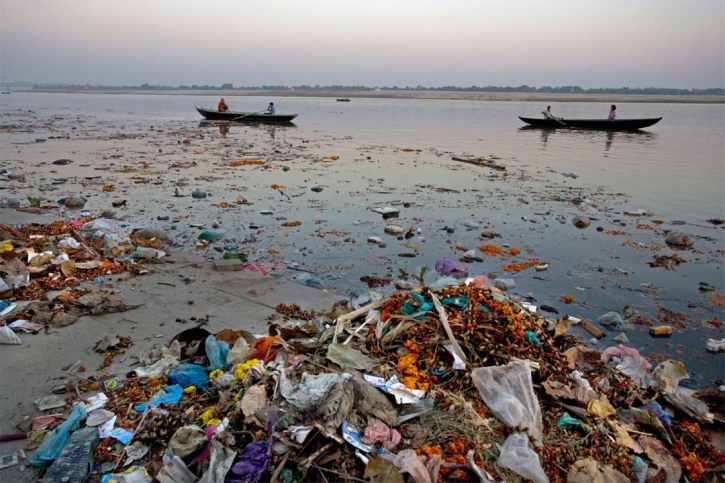
Staff Correspondent, Dhaka
Both solid and liquid waste are being dumped indiscriminately into the Padma River, posing a long-term threat of water pollution and river erosion.
Speaking to BSS on Tuesday, Professor Mijanur Rahman from the Department of Geography and Environmental Sciences at Rajshahi University (RU) said that solid and liquid waste is being dumped into the Padma and along the city protection embankment.
The Padma River in Rajshahi has become a victim of illegal encroachment and pollution, as solid waste — such as broken tiles and discarded concrete pieces — is being dumped along its banks, he said.
Mijanur Rahman also noted a decline in fish diversity due to river encroachment, indiscriminate fishing, the use of illegal fishing gear, agrochemical contamination, and plastic pollution.
He said: "A few years ago, I studied the liquid waste flowing through the sluice gate of the Water Development Board into the Padma River and found a significant level of pollution, which continues to worsen."
"The number of fish has also decreased significantly. Moreover, the use of river water for agriculture poses health risks, as research has found traces of metals in Padma’s water," he added.
He emphasized that institutions and factories should have effluent treatment plants, which are currently unavailable in Rajshahi.
Additionally, the city has 20,000–25,000 registered and unregistered easy bikes.
Garages servicing these vehicles dump battery acid into sewage drains, which eventually flow into the Padma, causing severe harm to aquatic life, Prof Rahman said.
Arifur Rahman Ankur, executive engineer of the Rajshahi Water Development Board, mentioned that liquid waste from the city flows into the Padma through five sluice gates.
However, when the water level rises during the monsoon, the gates are closed to prevent water from entering the city.
Household waste is also being dumped into the river, particularly in areas such as Bulanpur, Keshabpur, Srirampur, Kumarpara, Sekher Chowk, Panchabati, Talaimari and Shampur.
Several restaurants in the city, including those in Pathanpara, Dargarapara, Barakuthi and Srirampur, dispose of plastic, polythene and other waste directly into the river.
Runa Akhter, 54, who was seen dumping garbage near Kumarpara, said that everyone in the neighbourhood disposes of waste in the river.
Garbage is also being discarded indiscriminately into the T-dam in front of Keshabpur Police Line.
Plastic cups, bottles and polythene are scattered along the embankment.
Golam Rasul, who has been running a pan-bidi shop on the dam for 15 years, said: "Waste has been dumped into the Padma River for a long time."
The liquid waste flowing into the river through the sluice gates contains more harmful elements in the Dargapara area, further exacerbating pollution and endangering aquatic biodiversity.
Prof Chowdhury Sarwar Jahan from the Department of Geology and Mining at RU stated that liquid waste has already destroyed the aquatic biodiversity of the Baranai River, which flows adjacent to the city.
He emphasized that no solid or liquid waste should be dumped into the river, as it is prohibited by law.
Liquid waste mixes with water, depleting biological oxygen levels and endangering aquatic life.
Prof Chowdhury noted that the liquid waste entering the Padma through the city’s sluice gates is especially harmful in the Dargapara area, worsening water pollution and threatening aquatic biodiversity.
Pollution has already impacted the Baranai River in Paba Upazila, where aquatic biodiversity has been severely damaged.
Mizanur Rahman, chairman of Save the Nature and Live, said: "Plastic waste and polythene bags are the most harmful pollutants in the Padma River. Unfortunately, campaigns to reduce polythene usage have yielded little success."
He warned that if river pollution and encroachment are not addressed immediately, they will have devastating effects on the livelihoods of people in the Barind Tract.
"If immediate action is not taken, the people of the Barind Tract will face severe consequences," he added.





































